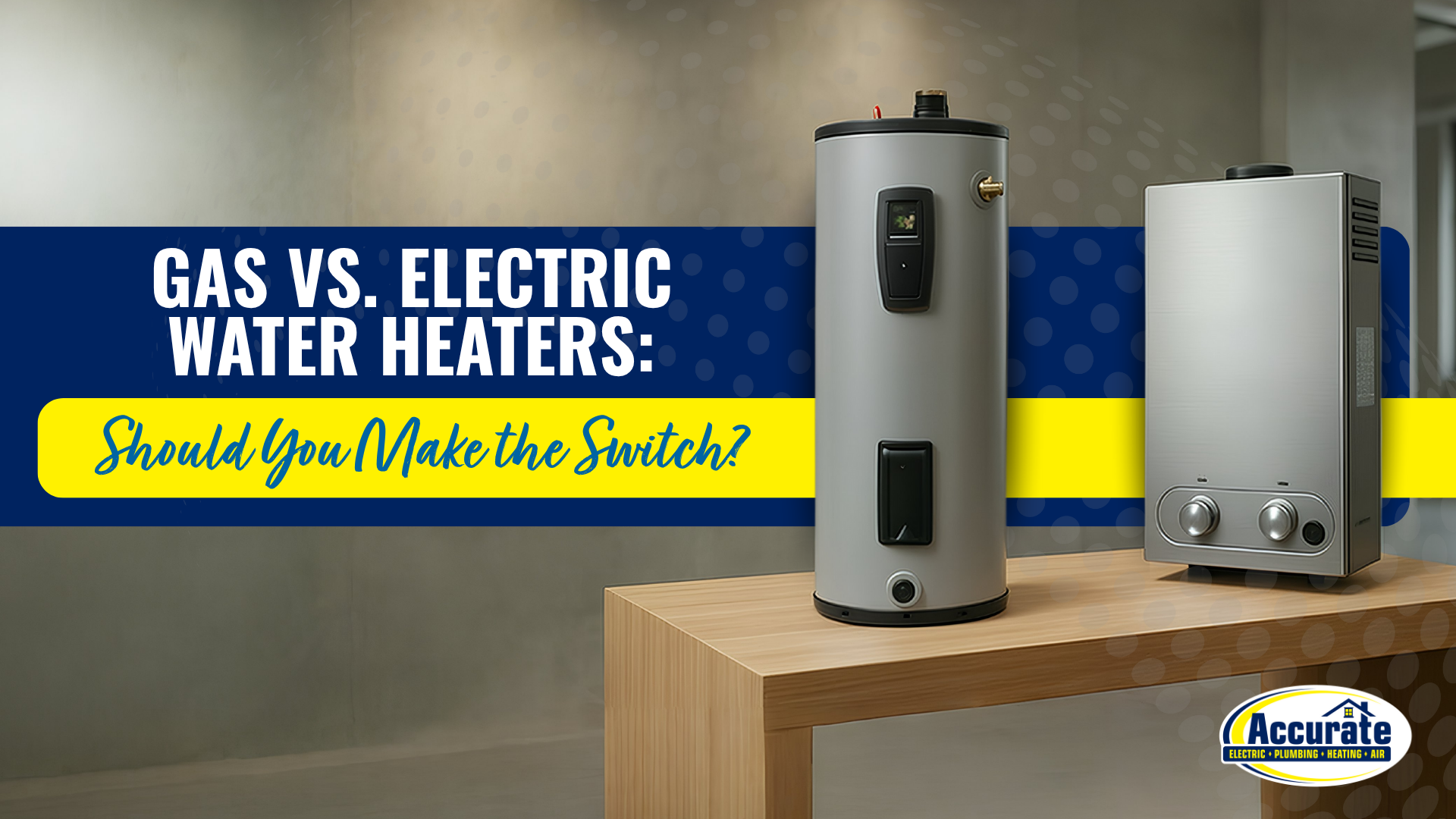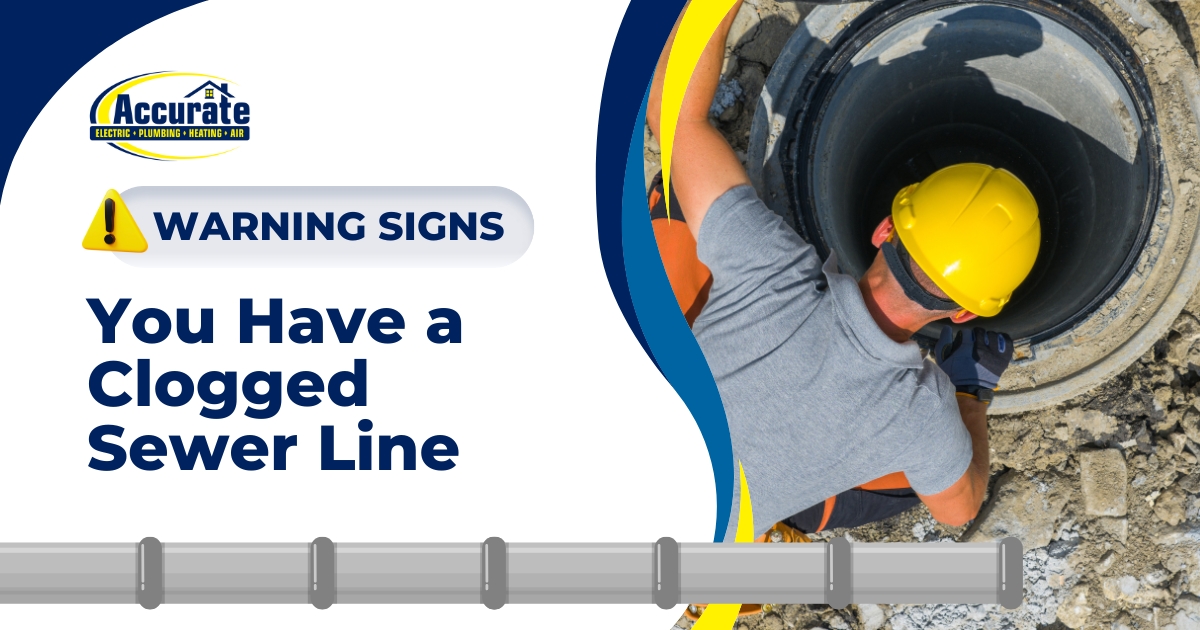What You Should Know
- There are some distinct differences between gas and electric water heaters that homeowners should know.
- Factors such as budget, energy source, and maintenance play a role in selecting the right type of water heater for your home.
- Consider factors such as energy efficiency and cost-effectiveness when selecting a new water heater.
Which Water Heater Is Right for You: Gas or Electric?
Whether you live in Glendora, the city of Rancho Cucamonga, or the surrounding areas, it’s important to have a reliable water heater for your everyday needs. If you’re thinking about upgrading, you may wonder whether a gas vs electric water heater is right for you. The experienced team at Accurate Electric, Plumbing, Heating, and Air has some helpful insight about both of these water heater types to make the process easier.
What’s the Difference Between Gas and Electric Water Heaters?
Before you replace a gas water heater with an electric water heater or vice versa in your Glendora home, it’s important to understand the differences between the two. As you compare gas and electric water heaters, you’ll want to explore several important aspects of each type. Both of these water heater styles work to heat your home’s water supply quickly, but they do so using different methods and components.
How each type heats water
Gas water heaters use natural gas or propane, which is burned to produce heat. A gas burner located at the bottom of the tank creates combustion that burns the oil or gas to heat the water. Electric water heaters use electricity to operate and contain a special coil or heating element to heat the water inside the tank.
Energy source availability and infrastructure
Electric water heaters are more common than gas since it’s easier to connect them to existing wiring and infrastructure. If you don’t already have a gas line running to your home, you’d need to have a new one installed if you want to switch to a gas water heater, which may increase your overall installation costs significantly.
Tank and tankless options for both types
While traditional gas and electric water heaters use a tank to store water, tankless models are also available for both energy sources. Tankless water heaters are compact, energy-efficient, and provide a constant supply of instantly heated water whenever you need it.
Which Is More Energy-Efficient and Cost-Effective?
Weighing the pros and cons of electric water heaters and gas water heaters should include looking at which option is more energy-efficient and cost-effective.
Upfront costs vs. long-term energy bills
Gas water heaters tend to have a higher upfront cost, but they may cost more over time in terms of long-term energy costs. Electric water heaters are cheaper to install, but the cost of electricity is generally higher than natural gas, making them more expensive to operate in the long term.
Utility rate fluctuations: electric vs. natural gas
Electricity rates tend to remain generally stable, making electric water heaters more consistent in terms of operating costs. Natural gas costs less than electricity, but prices are expected to rise in the future and tend to fluctuate much more significantly than electricity.
How Do Maintenance and Lifespan Compare?
As you explore the pros and cons of gas water heaters and electric water heaters, compare their maintenance needs and overall lifespan.
Typical maintenance requirements for each type
Both gas and electric water heaters require routine maintenance for optimum performance. However, gas water heaters may require more frequent maintenance due to the risk of gas leaks. Make sure you drain and refill your water heater tank per the manufacturer’s directions.
Average lifespan of gas vs. electric water heaters
Most electric water heaters have a longer lifespan than gas models. When properly maintained, most electric water heaters last between 10 and 15 years. Gas water heaters typically last between eight and 12 years with proper maintenance.
What impacts longevity and reliability?
Water quality may impact the longevity and reliability of your water heater. If you have hard water, excess mineral buildup may result in a shorter lifespan. Maintenance, water heater size compared to overall household water usage, and other factors also impact the longevity of your water heater.
Safety considerations and fire risk
Electric water heaters are generally considered safer than gas since there’s no risk of a dangerous carbon monoxide leak. The risk of an electrical fire is possible with electric water heaters, but it’s much less likely than a gas leak.
Should I Switch From Gas to Electric (or Vice Versa)?
If you’re still pondering whether to install an electric water heater near me or change to a gas water heater, consider these scenarios to help with your decision.
Scenarios where switching makes sense
There are some scenarios where switching from gas to electric water heaters, or vice versa, may make sense. For example, if you’re already planning to remodel your home and work is being done to the infrastructure, it’s a great time to make the switch since other work is already underway.
Incentives
Many states, local utility companies, and federal government programs offer various incentives that may encourage you to switch. The federal government’s Energy Efficient Home Improvement Credit offers homeowners tax credits for improvements like upgrading to more energy-efficient water heaters. Accurate also has special offers and discounts available to help you save even more.
Environmental impact and carbon footprint
Gas water heaters tend to have a more significant environmental impact and leave a much larger carbon footprint than electric water heaters. The combustion of natural gas releases greenhouse gases like CO2 into the air and relies on non-renewable fossil fuels to operate.
Ready to Upgrade Your Water Heater? Let’s Talk!
If you’re ready to book a water heater upgrade in Glendora or Rancho Cucamonga, the licensed, bonded, and insured local team at Accurate Electric, Plumbing, Heating, and Air is ready to help. Same-day and next-day installation is available, as well as several financing options to help make paying for your new water heater easier. If you’re ready to learn more or want to upgrade your water heater, contact us today!
Frequently Asked Questions
Are electric water heaters safer than gas models?
Overall, electric water heaters are considered safer than gas models. That’s because they don’t run the risk of a gas leak, which can be extremely dangerous and could release life-threatening carbon monoxide into the air.
Do electric water heaters produce fewer emissions than gas ones?
Yes, electric water heaters produce much fewer emissions than gas ones and technically do not produce any direct emissions whatsoever. Gas water heaters operate using combustion, which releases carbon dioxide (CO2) emissions into the air during operation.
What factors should I consider before making the switch?
Consider factors like existing infrastructure and installation costs, maintenance requirements, energy efficiency, and environmental impact before making the switch. Weigh the pros and cons of each to determine which is the best choice for you and your unique needs.






